Related Research Articles
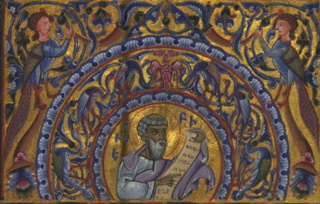
Eusebius of Caesarea, also known as Eusebius Pamphilus, was a Greek or Palestinian historian of Christianity, exegete, and Christian polemicist. In about AD 314 he became the bishop of Caesarea Maritima in the Roman province of Syria Palaestina. Together with Pamphilus, he was a scholar of the biblical canon and is regarded as one of the most learned Christians during late antiquity. He wrote Demonstrations of the Gospel, Preparations for the Gospel and On Discrepancies between the Gospels, studies of the biblical text. As "Father of Church History", he produced the Ecclesiastical History, On the Life of Pamphilus, the Chronicle and On the Martyrs. He also produced a biographical work on Constantine the Great, the first Christian Roman emperor, who was augustus between AD 306 and AD 337.
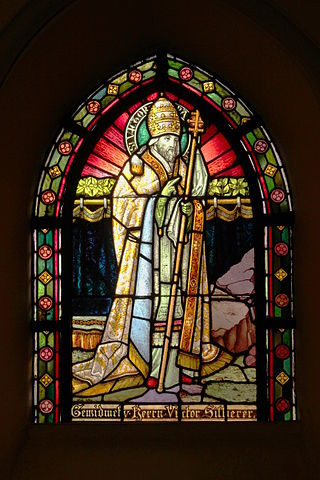
Pope Victor I was a Roman African prelate of the early Christian Church who served as Bishop of Rome in the late second century. The dates of his tenure are uncertain, but one source states he became pope in 189 and gives the year of his death as 199. He was born in the Roman Province of Africa—probably in Leptis Magna. He was later considered a saint. His feast day is celebrated on 28 July as "St Victor I, Pope and Martyr". He was of Berber origin.
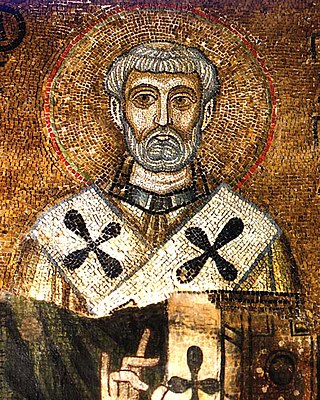
Pope Clement I was bishop of Rome in the late first century AD. He is listed by Irenaeus and Tertullian as the bishop of Rome, holding office from 88 AD to his death in 99 AD. He is considered to be the first Apostolic Father of the Church, one of the three chief ones together with Polycarp and Ignatius of Antioch.

Flavia Julia Helena, also known as Helena of Constantinople and in Christianity as Saint Helena, was an Augusta of the Roman Empire and mother of Emperor Constantine the Great. She was born in the lower classes traditionally in the Greek city of Drepanon, Bithynia, in Asia Minor, which was renamed Helenopolis in her honor, although several locations have been proposed for her birthplace and origin.

The Patriarch of Alexandria is the archbishop of Alexandria, Egypt. Historically, this office has included the designation "pope".

James the Just, or a variation of James, brother of the Lord, was "a brother of Jesus", according to the New Testament. He was an early leader of the Jerusalem Church of the Apostolic Age. Traditionally, it is believed he was martyred in AD 62 or 69 by being stoned to death by the Pharisees on order of High Priest Ananus ben Ananus.
The Apostolic Fathers, also known as the Ante-Nicene Fathers, were core Christian theologians among the Church Fathers who lived in the 1st and 2nd centuries AD who are believed to have personally known some of the Twelve Apostles or to have been significantly influenced by them. Their writings, though widely circulated in early Christianity, were not included in the canon of the New Testament. Many of the writings derive from the same time period and geographical location as other works of early Christian literature which came to be part of the New Testament.

Macarius I ; was Bishop of Jerusalem from 312 to shortly before 335, according to Sozomen. He is recognized as a saint within the Orthodox and Catholic churches.

Simeon of Jerusalem was a Jewish Christian leader and according to most Christian traditions the second Bishop of Jerusalem, succeeding James, brother of Jesus. Simeon is sometimes identified with Simon, brother of Jesus, and has also been identified with the Apostle Simon the Zealot.
According to Eastern Christian tradition, Addai of Edessa or Thaddeus of Edessa was one of the seventy disciples of Jesus. He is possibly identical with Thaddaeus, one of the Twelve Apostles. From an early date his hagiography is filled with legends and fabrications. The saint himself may be entirely fictitious.
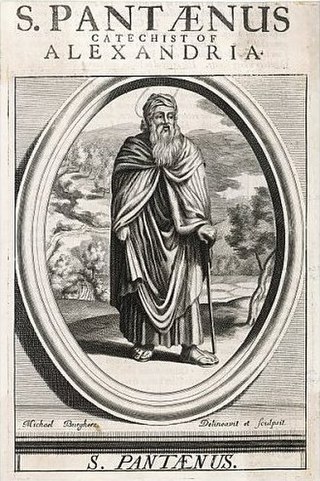
Saint Pantaenus the Philosopher was a Greek theologian and a significant figure in the Catechetical School of Alexandria from around AD 180. This school was the earliest catechetical school, and became influential in the development of Christian theology.

Zoara, the biblical Tzo'ar, was one of the five "cities of the plain" – a pentapolis at the time of Abraham, it was a highly fertile valley apparently located along the lower Jordan Valley and the Dead Sea plain and mentioned in the Book of Genesis. The city was said to have been spared the "brimstone and fire" which destroyed Sodom and Gomorrah in order to provide a refuge for Lot and his daughters. It is mentioned by Josephus; by Ptolemy ; and by Eusebius and Saint Jerome in the Onomasticon. The Catholic Encyclopedia called it "a flourishing oasis where the balsam, indigo, and date trees bloom luxuriantly".

Alexander of Jerusalem was a third century bishop who is venerated as a martyr and saint by the Eastern Orthodox Church, Oriental Orthodox churches, and the Roman Catholic Church. He died during the persecution of Emperor Decius.

Saint Narcissus of Jerusalem was an early patriarch of Jerusalem. He is venerated as a saint by both the Western and Eastern Churches. In the Roman Catholic Church, his feast day is celebrated on October 29, while in the Eastern Orthodox Church it is celebrated on August 7.
Matthias of Jerusalem was a 2nd-century Christian saint and a Bishop of Jerusalem, whose episcopacy was about 113–120 AD.

The Church History of Eusebius, the bishop of Caesarea was a 4th-century pioneer work giving a chronological account of the development of Early Christianity from the 1st century to the 4th century. It was written in Koine Greek, and survives also in Latin, Syriac and Armenian manuscripts.
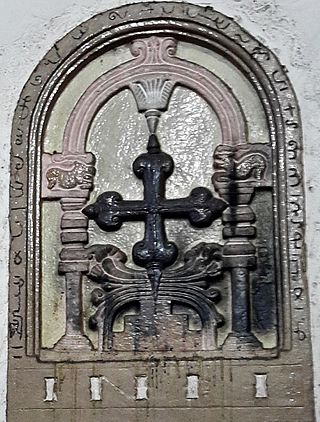
Christianity is the third-largest practiced religion in Kerala, accounting for 18% of the population according to the Indian census. Although a minority, the Christian population of Kerala is proportionally much larger than that of India as a whole. A significant portion of the Indian Christian population resides in the state.
Early Christianity, also called the Early Church or Paleochristianity, describes the historical era of the Christian religion up to the First Council of Nicaea in 325. Christianity spread from the Levant, across the Roman Empire, and beyond. Originally, this progression was closely connected to already established Jewish centers in the Holy Land and the Jewish diaspora. The first followers of Christianity were Jews who had converted to the faith, i.e. Jewish Christians. Early Christianity contains the Apostolic age and is followed by, and substantially overlaps with, the Patristic era.
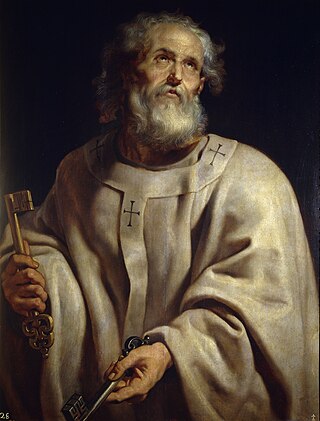
Saint Peter, also known as Peter the Apostle, Simon Peter, Simeon, Simon, or Cephas, was one of the Twelve Apostles of Jesus Christ and one of the first leaders of the early Christian Church. He appears repeatedly and prominently in all four New Testament gospels as well as the Acts of the Apostles. Catholic and Orthodox tradition accredits Peter as the first bishop of Rome—or pope—and also as the first bishop of Antioch.
John I of Jerusalem was the seventh Bishop of Jerusalem.
References
- ↑ Catholic Online
- ↑ Eusebius, Church History, Book V, chapter 12.